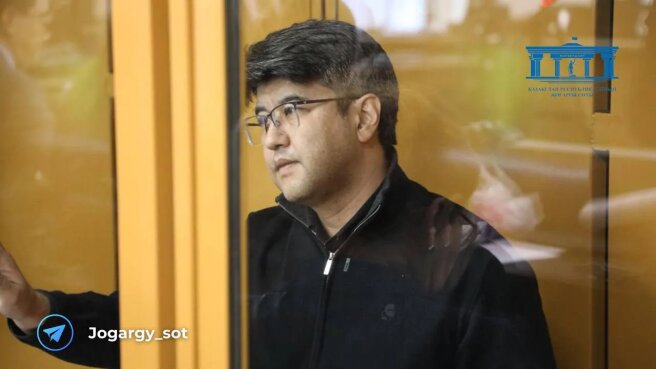"She left and came back 12 times." New details of the high-profile case of the murder of Saltanat Nukenova by her own husband

In Kazakhstan, legal arguments continue in the sensational case of the murder of Saltanat Nukenova, which was committed by former Minister of Economy Kuandyk Bishimbayev. At this point, he, his mother, the defense, the prosecutor, the brother of the deceased girl and her family’s lawyer spoke.
Kuandyk Bishimbayev said that his defenders had already voiced most of his arguments, and said that he never denied his guilt in what happened: “Yesterday they called me a man without a heart, who does not repent and does not feel pain, or denigrates Saltanat.” He also said that it was a surprise for him to be presented with the most severe charges two days after the arrest and he did not know how to react to this, so he was in an “emotional turmoil”, which prevented him from immediately testifying. And he himself did not intend to evade their dacha.
According to him, he deeply repents and asks the Almighty for forgiveness: “Consciously or not, everything happened the way it happened. You saw in the video: my greatest pain is when they take me - I worry and can’t understand how I can watch in the eyes of Saltanat's parents." He stated that he was forced to defend himself, but not at all because he was a “heartless person,” and added that he was ready to accept any punishment and would treat it as atonement.
At the same time, he continues to deny that he had any intent and insists that he had no motive for killing his wife: “I gain nothing from this. Everything that happened that evening, unfortunately, the tragedy with the death of Saltanat, is everything happened unintentionally, unintentionally.” At the same time, he does not consider the beatings that were filmed on his phone camera and shown in court to be torture: according to him, there were no systematic beatings on his part, and his wife was not emotionally or in any other way dependent on him.
At the same time, prosecutor Aizhan Aimaganova emphasized in the debate that, as it turned out during the investigation, Saltanat Nukenova was subjected to torture in March, April, August and October 2023. This was confirmed by the testimony of her brother, photo and video materials, correspondence and notes from Saltanat herself, which were attached to the case. The girl received injuries when she lived with Kuandyk Bishimbayev.
Aizhan Aimaganova stated that Kuandyk Bishimbayev systematically humiliated his wife, did not allow her to sleep, communicate with family and friends, and even forced her to take medications that were not prescribed by the doctor: “Saltanat Nukenova developed a guilt complex formed by Bishimbayev. This explains the indecision in trying to break up.” toxic relationships. According to scientific research, abusive relationships are cyclical in nature. Periods of violence are replaced by calm behavior and apologies, which makes it difficult for the victim to decide to leave. Therefore, Saltanat Nukenova left and returned again 12 times."
Kuandyk Bishimbayev’s mother also spoke in court. She stated that “the Almighty has prepared a huge test for her family and the family of the deceased Sultanat Nukenova” and that “Saltanat’s death is a loss not only for her parents, but also for Kuandyk himself.” "As a mother, I am praying for my son. He committed an act that became a tragedy. No one has the right to take the life of another person. This is a terrible and unbearable pain for me, my husband and all our relatives. The decision that the court and jury will make , my son will bear it with humility and repentance."
According to her, the negative characterization that the lawyers of Saltanat Nukenova’s family gave to her son was pressure on the jury, and he himself grew up in a family where they did not know what violence was. At the same time, she noted that she had failed as a mother and would spend the rest of her life thinking about where she went wrong in raising her son. "We raised him in the best traditions of the Kazakh family. We had a big, friendly family. Five generations of us lived in one house. My children did not see violence in the family. Kuandyk grew up in kindness and love. He is our long-awaited son, and we tried our best for him instill kindness, respect, responsibility, a sense of decency. He always treated his family with care and love." According to the defendant’s mother, he treated Saltanat Nukenova the same way, and the tragedy occurred due to jealousy, alcohol and nervous exhaustion. She asked the jury to spare her son for the sake of his four children, three of whom have not yet reached adulthood.
Saltanat Nukenova’s brother Aitbek Amangeldy also spoke in court. He said that she planned to leave Kuandyk Bishimbayev on the day of the tragedy, but she couldn’t. He asked for a fair punishment for the defendant and drew the jury's attention to how his face changes when he talks to female lawyers. According to the brother of the murdered girl, his gaze shows disrespect and cannot be trusted.
Let us recall that in Kazakhstan, on the night of November 8-9, Saltanat Nukenova was brutally murdered. Her husband, former Minister of Economy Kuandyk Bishimbayev, is accused of this crime. During the judicial investigation, it turned out that the day before he had filmed himself mocking her and demanding confirmation that she had a relationship with another man. At first he denied any involvement in the recording of this video, but then called it a “response to humiliation.”
It also turned out in court that when, after the beatings, Saltanat Nukenova stopped showing signs of life, Kuandyk Bishimbayev did not call emergency services, but wrote to a clairvoyant friend who assured him that everything would be fine. After that, he corresponded with a girl providing escort services, he tried to make an appointment with her.
The case of Saltanat Nukenova became so resonant that it became the impetus for the adoption of a law on ensuring the rights of women and the safety of children in Kazakhstan, aimed primarily at the criminalization of domestic violence.



















